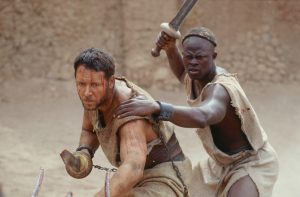AFTER a decent practice run in the historical drama sub-genre with 1492: Conquest of Paradise, the great British director Ridley Scott sought to bring the Roman gladiatorial age back to mainstream cinema.
Sword and sandals films, most notably the Oscar winning religious epic Ben Hur, were staple viewing for audiences until around the 1960s.
For a few decades they popped up every now and then until Scott gave us the completely entertaining Gladiator in 2000, spawning a resurgence in interest and box-office reliability.
Apart from needing a shit-ton of money to make the epic, Scott also needed a bankable star. But instead he gambled on the still relatively unknown Australian Russell Crowe.
At the time of his casting Crowe was still best known for his electric performance in the Australian 1992 film Romper Stomper.
His international career was just starting, making a particularly good impression with 1997’s LA Confidential, but he was no Charlton Heston in Ben Hur or Kirk Douglas in Spartacus.
Until the film came out, of course, when both his performance and that of Joaquin Phoenix, another relative newcomer at the time, were widely praised and seen as just as pivotal to the film’s success as Scott’s direction.
In every technical aspect, from the sets and production design to visual effects and soundtrack, Scott’s film puts every dollar of the budget to the greatest use on the screen.
The script, however, was another matter with stories of the cast and crew even having to wait around on set for periods while multiple re-writes were hastily completed over several weeks.
The end result doesn’t reflect these problems; in fact the story of Roman general Maximus Decimus Meridius, who is betrayed by a friend and sold into slavery, only to take his revenge in the Collisseum’s gladiator pit, is as strong as any sword and sandals tale has ever been.
In a film packed full of highlights, the action set-pieces obviously take centre-stage, from the opening battle in the Germanic forest, to the epic staged confrontations involving chariots, tigers and an assortment of formidable and vicious combatants, the gladiatorial combat is incredibly visual and involving.
But some of the best scenes also arise from the powerful confrontations between Maximus and his nemesis Commodus, one of the great villains and testament to Phoenix’s incredible talent, as well as the contributions of others in the ensemble cast including Connie Neilsen, who has never been better as the third character in a complex emotional triangle, and veterans like the late Oliver Reed, who died during the production, Richard Harris, Derek Jakobi and David Hemmings.
The winner of five Academy Awards, including Best Picture, Gladiator is the perfect choice for cinema’s greatest honour with its combination of technical achievement and emotional heft giving it universal appeal.
